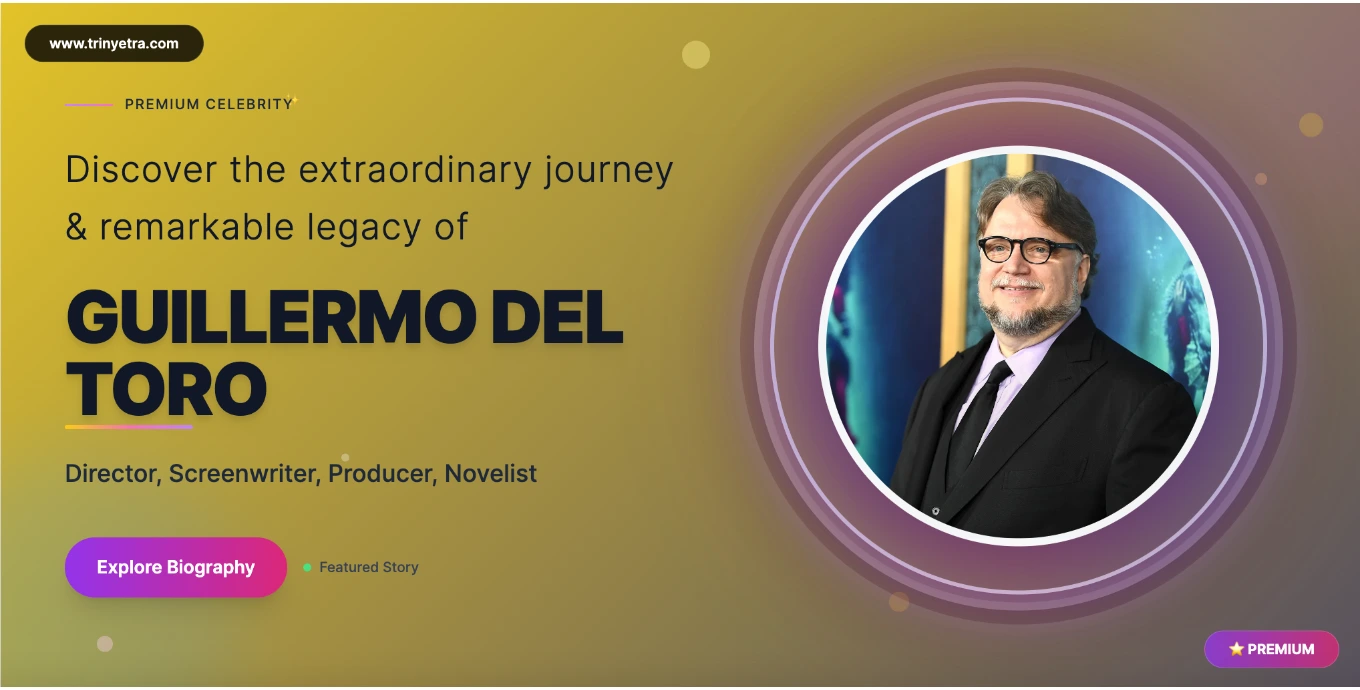 Director
Director
Denis Villeneuve Biography, Age, Net Worth, Height, Movies & Latest Updates

Denis Villeneuve worked in many superhit films. Know about Denis Villeneuve's biography, affairs, age, birthday, father's name, mother's name, religion, girlfriend, Date of Birth, family, relationship, wife, marriage, show list, annual salary & net worth, awards, height, weight, body measurements, controversies, new photos, and latest updates.
The Canadian filmmaker has redefined modern science fiction cinema with his visually stunning masterpieces Arrival, Blade Runner 2049, and the epic Dune saga. With his meticulous craftsmanship and emotional storytelling, Villeneuve has become one of Hollywood's most respected directors. His estimated net worth reflects his success across both independent Quebec cinema and big-budget Hollywood blockbusters.
From humble beginnings in Gentilly, Quebec, to directing some of the most critically acclaimed films of the 21st century, Denis Villeneuve's journey showcases artistic vision combined with commercial success. His unique ability to blend intimate human stories with grand spectacle has earned him multiple Academy Award nominations and international recognition.
| Real Name | Denis Villeneuve |
|---|---|
| Nick Name | Denis |
| Profession | Film Director, Screenwriter, Producer |
| Date of Birth | 3 October 1967 |
| Age | 57 years (as of 2025) |
| Birth Place | Gentilly, Bécancour, Quebec, Canada |
| Height | 6'0" / 182 cm |
| Weight | Approx. 175 lbs / 79 kg |
| Net Worth | $25 million (estimated) |
| Marital Status | Married |
| Nationality | Canadian |
Table of Contents
Denis Villeneuve's Bio
Denis Villeneuve is famous as one of cinema's most visionary directors and is a prominent figure in the international film industry. He is renowned as a filmmaker and is considered one of the most talented directors working in both French and English-language cinema today.

|
Denis Villeneuve's rise to international fame began with his Quebec films before transitioning to Hollywood, where he revolutionized science fiction cinema. His breakthrough came with Incendies, which earned an Academy Award nomination for Best International Feature Film, establishing him as a major talent. Known for his meticulous attention to detail and philosophical depth, Villeneuve creates films that challenge audiences while delivering spectacular visual experiences.
Currently recognized as one of the most important filmmakers of his generation, Villeneuve has garnered critical acclaim and commercial success with films like Arrival, Blade Runner 2049, and the Dune saga. His work combines intellectual themes with stunning cinematography, earning him a devoted following among critics and audiences worldwide. The director's influence extends beyond entertainment, often addressing complex themes of identity, memory, and human connection.
Like other successful directors such as George Miller and Ridley Scott, Denis Villeneuve has carved a unique niche in contemporary cinema with his distinctive visual style and storytelling approach.
Denis Villeneuve's Early Life & Education
Childhood & Family Background
Denis Villeneuve was born on October 3, 1967 in Gentilly, Bécancour, Quebec, Canada. His father's name is Jean Villeneuve, and his mother's name is Nicole Demers. Denis is the eldest of four children, with his brother Martin Villeneuve also becoming a filmmaker, demonstrating the family's creative inclinations.
Growing up in a French-Canadian household in Quebec, Denis was exposed to both French and North American cultural influences that would later shape his cinematic perspective. His family encouraged creativity and intellectual curiosity, fostering an environment where artistic expression was valued. The Villeneuve household emphasized education and cultural awareness, with both parents supporting their children's diverse interests and ambitions.
Educational Journey
Denis Villeneuve completed his early education at Séminaire Saint-Joseph de Trois-Rivières, where he developed his foundational academic skills. Initially, he pursued science studies at Cégep de Trois-Rivières, showing an aptitude for analytical thinking that would later influence his methodical approach to filmmaking.
Recognizing his passion for cinema, Villeneuve transitioned to studying film at Université du Québec à Montréal (UQAM). During his time at university, he immersed himself in film theory, history, and practical filmmaking techniques. His academic journey included participation in the National Film Board's La Course destination monde program, which provided early professional experience and helped establish his career foundation.
Denis Villeneuve's Personal Life
Relationships & Dating History
Denis Villeneuve is currently married to Tanya Lapointe, a filmmaker and producer who has collaborated with him on several projects. The couple married in 2020, formalizing a professional and personal partnership that spans many years. Their relationship represents a perfect blend of creative collaboration and personal compatibility.
Previously, Villeneuve was in a long-term relationship with actress Macha Grenon, with whom he has three children. His daughter Salomé Villeneuve has followed in her father's footsteps, pursuing a career in filmmaking. Villeneuve maintains a strong relationship with all his children and often speaks about the importance of family balance in his demanding career.
Lifestyle & Personal Interests
Denis Villeneuve is known for his thoughtful and introspective personality. He enjoys reading science fiction literature, studying cinema history, and exploring philosophical concepts that often influence his films. His favorite activities include storyboarding, which he considers essential to his creative process, and spending time in nature for inspiration.
| Favorite Food | Traditional Quebecois cuisine |
|---|---|
| Favorite Color | Earth tones, muted colors |
| Favorite Directors | Stanley Kubrick, Andrei Tarkovsky, Ridley Scott |
| Favorite Music | Classical, Electronic, Ambient |
| Hobbies | Reading, Photography, Storyboarding |
| Favorite Destination | Iceland, Jordan (Dune filming locations) |
Villeneuve maintains a relatively private lifestyle despite his international fame, preferring to let his work speak for itself. He supports environmental causes and often incorporates ecological themes into his films. The director practices meditation and mindfulness, which he credits for maintaining creative clarity during complex film productions.
Denis Villeneuve's Career Journey
Career Debut & Early Struggles
Denis Villeneuve started his professional career in 1990 with La Course destination monde, a National Film Board program that provided young filmmakers with international documentary opportunities. His feature film breakthrough came with August 32nd on Earth (1998), which premiered at the Cannes Film Festival's Un Certain Regard section, immediately establishing him as a talent to watch in international cinema.
| Career Debut | |
|---|---|
| First Movie | August 32nd on Earth (1998) |
| Director | Denis Villeneuve |
| Co-stars | Pascale Bussières, Alexis Martin |
| Role | Director, Writer |
| Recognition | Cannes Un Certain Regard selection |
Villeneuve's early career focused on Quebec cinema, where he developed his distinctive visual style and thematic preoccupations. Films like Maelström (2000) earned critical acclaim and multiple Genie Awards, establishing his reputation in Canadian cinema. His early works explored themes of identity, guilt, and redemption that would become recurring elements throughout his career.
Major Success & Recognition
Denis Villeneuve gained massive international recognition with Incendies (2010), which received an Academy Award nomination for Best International Feature Film. This powerful drama about war, family secrets, and identity demonstrated his ability to handle complex narratives with emotional depth and visual sophistication.
His transition to English-language cinema proved remarkably successful with Prisoners (2013), Enemy (2013), and Sicario (2015), each showcasing different aspects of his directorial range. These films established him as a master of tension and psychological complexity, earning critical acclaim and commercial success in international markets.

|
Villeneuve's science fiction trilogy of Arrival (2016), Blade Runner 2049 (2017), and the Dune films represents the pinnacle of his career achievements. These films combine philosophical depth with spectacular visuals, earning multiple Academy Award nominations, including Best Director for Arrival. His current status as one of cinema's premier directors continues with upcoming projects and continued collaboration with major studios.
Denis Villeneuve's Net Worth & Financial Success
Denis Villeneuve has achieved remarkable financial success through his career in filmmaking. As of 2025, his estimated net worth is $25 million, making him one of the highest-paid directors in contemporary cinema, particularly in the science fiction genre.
| Net Worth (2025) | $25 million (estimated) |
|---|---|
| Annual Income | $8-12 million |
| Monthly Income | $800K - $1.2 million |
| Per Film Fee | $5-10 million |
| Producer Fees | $2-5 million per project |
| Other Income Sources | Consulting, Commercial directing, Royalties |
Villeneuve's income stems from multiple sources, including director fees, producer credits, backend participation in box office profits, and consulting work. His Dune films reportedly earned him significant backend participation, with the franchise's success contributing substantially to his wealth. Additionally, his work on commercials and shorter projects provides a steady income between major film productions.
Luxury Lifestyle & Assets
Denis Villeneuve maintains a relatively modest lifestyle compared to many Hollywood directors, reflecting his Canadian sensibilities and focus on artistic integrity over material excess. He owns properties in Montreal, Quebec, and maintains a residence in Los Angeles for his Hollywood work, totaling approximately $4-6 million in real estate assets.
| Houses | Montreal residence - $2.5 million Los Angeles property - $3.5 million |
|---|---|
| Cars | Tesla Model S - $95,000 Audi e-tron - $75,000 Modest collection focused on sustainability |
| Investments | Film production companies, Tech startups, Real estate |
Denis Villeneuve's Physical Appearance & Style
| Height | 6'0" / 182 cm |
|---|---|
| Weight | 175 lbs / 79 kg (approx.) |
| Body Type | Average build |
| Eye Color | Brown |
| Hair Color | Dark brown (graying) |
| Skin Tone | Fair |
| Distinctive Features | Thoughtful expression, salt-and-pepper beard |
Denis Villeneuve is known for his understated and professional appearance. He maintains his physique through regular walking and cycling, often incorporating physical activity into his location scouting and film preparation processes. His style evolution reflects his transition from Quebec independent cinema to Hollywood productions while maintaining his authentic, unpretentious approach.
Villeneuve's fashion sense emphasizes functionality and comfort, typically wearing dark jackets, simple shirts, and practical footwear suitable for film sets. His style choices reflect his focus on work over fashion, though he presents professionally at premieres and industry events. The director's natural aging process and salt-and-pepper beard have become part of his distinguished appearance in recent years.
Denis Villeneuve's Awards & Achievements
Denis Villeneuve has received numerous accolades for his outstanding contribution to international cinema. His talent has been recognized both nationally in Canada and internationally, with multiple Academy Award nominations highlighting his global impact.
| Year | Award | Category | Movie/Work |
|---|---|---|---|
| 2017 | Academy Awards | Best Director (Nomination) | Arrival |
| 2022 | Academy Awards | Best Picture (Nomination) | Dune |
| 2025 | Academy Awards | Best Picture (Nomination) | Dune: Part Two |
| 2001 | Genie Awards | Best Director | Maelström |
| 2010 | Genie Awards | Best Director | Polytechnique |
| 2011 | Canadian Screen Awards | Best Director | Incendies |
Major Recognition & Honors
Denis Villeneuve has achieved several significant milestones including being named Officer of the Order of Canada (OC) in 2018 and Knight of the National Order of Quebec (CQ) in 2019. He was also honored as Filmmaker of the Decade by the Hollywood Critics Association in 2019, recognizing his consistent excellence throughout the 2010s.
His contributions to cinema include revolutionizing science fiction filmmaking, mentoring emerging filmmakers, and bridging French and English-language cinema. Villeneuve has received honorary degrees from several universities and continues to be recognized for his cultural impact both in Canada and internationally.
Denis Villeneuve's Latest News & Upcoming Projects
Current Projects (2025)
Currently, Denis Villeneuve is developing Dune: Messiah, the highly anticipated third installment of his Dune saga, scheduled for production in 2025-2026. The director is also attached to several other science fiction projects, including a rumored adaptation of Arthur C. Clarke's Rendezvous with Rama, which has generated significant excitement among genre fans.
| Project | Role | Status | Expected Timeline |
|---|---|---|---|
| Dune: Messiah | Director, Producer | Development | 2026-2027 |
| Rendezvous with Rama | Director | Rumored | TBA |
| Untitled Sci-Fi Project | Director, Producer | Early Development | TBA |
Recent News & Updates
Following the massive success of Dune: Part Two in 2024, Villeneuve has been in high demand for interviews and film festival appearances. Recent industry reports suggest he's considering a return to smaller, more intimate filmmaking after completing the Dune trilogy, potentially exploring themes similar to his early Quebec cinema work.
The director recently signed a multi-year deal with Warner Bros. that provides him with significant creative control and resources for future projects. Industry insiders report that Villeneuve is particularly interested in developing original science fiction properties rather than adaptations, marking a potential shift in his creative approach for the late 2020s.
Trending 2025 News Snippets
- Sept 2025: Denis Villeneuve confirmed for Cannes Film Festival 2026 jury presidency
- Aug 2025: Dune: Part Two surpasses $700 million worldwide, cementing franchise success
- July 2025: Villeneuve announces new production company focusing on emerging Canadian filmmakers
- June 2025: Director receives honorary doctorate from McGill University
- May 2025: Tanya Lapointe and Denis Villeneuve announce collaborative documentary project
Denis Villeneuve's Controversies & Challenges
Unlike many high-profile directors, Denis Villeneuve has maintained a remarkably clean public image throughout his career, with no major controversies or scandals. His professional challenges have primarily centered on the complexities of adapting beloved source material, particularly with Blade Runner 2049 and the Dune films, where fan expectations created significant pressure.
The director has faced criticism from some science fiction purists regarding his interpretations of classic works, though these debates have generally remained within respectful critical discourse. Villeneuve has addressed these concerns openly in interviews, explaining his approach to adaptation and the necessity of updating stories for contemporary audiences while respecting the source material's core themes.
His commitment to practical effects over CGI has occasionally created budget and scheduling challenges, particularly during the production of Dune, but these professional hurdles have ultimately contributed to the films' critical acclaim. Villeneuve's reputation for professionalism and collaborative approach has helped him navigate the complexities of large-scale filmmaking while maintaining artistic integrity.
Denis Villeneuve's Interesting Facts & Trivia
Here are some fascinating and lesser-known facts about Denis Villeneuve that showcase his unique personality and creative journey:
- Denis Villeneuve originally considered becoming a scientist before discovering his passion for cinema during his studies at UQAM.
- He has a hidden talent for detailed storyboarding and personally creates thousands of drawings for each film to visualize complex sequences.
- His first professional payment from filmmaking was $500 from the National Film Board, which he used to buy film equipment.
- Denis Villeneuve is fluent in both French and English, often switching between languages during international interviews.
- He has a specific phobia of heights but overcame it to film aerial sequences for several movies.
- Meditating for 20 minutes every morning is something he does every day without fail to maintain creative clarity.
- Villeneuve was discovered through his participation in the NFB's La Course destination monde competition in 1990.
- He has never used a smartphone on set, preferring traditional communication methods during filming.
- Denis Villeneuve secretly supports several film schools in Quebec, providing scholarships for emerging filmmakers.
- His favorite collaborator is editor Joe Walker, with whom he's worked on all his major Hollywood films.
- Villeneuve owns a rare collection of science fiction first editions, including signed copies of Frank Herbert's original Dune novels.
- He once spent three months in Iceland preparing for Arrival, studying the landscape's influence on emotional storytelling.

|
Denis Villeneuve's Social Media & Fan Following
Denis Villeneuve maintains a notably limited social media presence, preferring to let his films communicate with audiences rather than engaging in direct social media interaction. This approach reflects his preference for privacy and focus on artistic work over public celebrity.
| Platform | Handle | Status | Content Type |
|---|---|---|---|
| No official account | Not active | N/A | |
| Twitter/X | No official account | Not active | N/A |
| Limited presence | Minimal activity | Official announcements only | |
| YouTube | Via film studios | Content through distributors | Behind-the-scenes, interviews |
Villeneuve's minimal social media strategy reflects his belief that films should speak for themselves. His most significant online presence occurs through official studio accounts and film festival coverage, where behind-the-scenes content and interviews are shared. The director prefers traditional media interviews and film festival appearances for public engagement.
Despite his limited personal social media presence, Villeneuve has millions of fans worldwide who create extensive fan communities discussing his films, sharing analysis, and celebrating his work across all platforms. His influence extends far beyond direct social media engagement through the cultural impact of his filmography.
Frequently Asked Questions About Denis Villeneuve
Personal Information
What is Denis Villeneuve's real age and birth date?
Denis Villeneuve was born on October 3, 1967, and is currently 57 years old as of 2025.
What is Denis Villeneuve's height and weight?
Denis Villeneuve stands 6'0" (182 cm) tall and weighs approximately 175 lbs (79 kg).
Is Denis Villeneuve married or in a relationship?
Denis Villeneuve is married to Tanya Lapointe, a filmmaker and producer. They married in 2020 after years of professional and personal partnership. He was previously in a long-term relationship with actress Macha Grenon.
Does Denis Villeneuve have any children?
Yes, Denis Villeneuve has three children from his previous relationship, including daughter Salomé Villeneuve, who is also a filmmaker following in her father's footsteps.
What is Denis Villeneuve's educational background?
Denis Villeneuve completed his early education at Séminaire Saint-Joseph de Trois-Rivières, studied science at Cégep de Trois-Rivières, and later studied cinema at Université du Québec à Montréal (UQAM).

|
Career & Professional Life
How did Denis Villeneuve start his career?
Denis Villeneuve began his career in 1990 through the National Film Board's "La Course destination monde" program, which provided young filmmakers with documentary opportunities. His feature debut came with "August 32nd on Earth" in 1998.
What are Denis Villeneuve's most successful movies?
Denis Villeneuve's biggest hits include "Incendies" (2010), "Arrival" (2016), "Blade Runner 2049" (2017), "Dune" (2021), and "Dune: Part Two" (2024), which have earned critical acclaim and commercial success worldwide.
What are Denis Villeneuve's upcoming projects in 2025?
Denis Villeneuve is currently developing "Dune: Messiah," the third installment of his Dune saga, scheduled for production in 2025-2026. He's also attached to several other science fiction projects in early development.
How much does Denis Villeneuve earn per movie?
Denis Villeneuve reportedly earns $5-10 million per film as director, with additional producer fees and backend participation that can significantly increase his total compensation per project.
Financial & Lifestyle
What is Denis Villeneuve's net worth in 2025?
As of 2025, Denis Villeneuve's estimated net worth is $25 million, earned through directing fees, producer credits, backend participation, and other film-related income sources.
Where does Denis Villeneuve live?
Denis Villeneuve maintains residences in Montreal, Quebec (his primary home) and Los Angeles, California (for his Hollywood work), with total real estate assets valued at approximately $6 million.
What awards has Denis Villeneuve won?
Denis Villeneuve has won multiple Canadian Screen Awards and Genie Awards for Best Director. He's received Academy Award nominations for Best Director ("Arrival") and Best Picture ("Dune" films). He's also an Officer of the Order of Canada and Knight of the National Order of Quebec.
Does Denis Villeneuve use social media?
Denis Villeneuve maintains a minimal social media presence, preferring to let his films communicate with audiences rather than engaging in direct social media interaction.
Filmmaking & Creative Process
What is Denis Villeneuve's filmmaking style?
Denis Villeneuve is known for meticulous visual craftsmanship, long takes, immersive world-building, and thematic focus on identity, memory, and moral ambiguity. He combines intimate human stories with grand spectacle.
Who are Denis Villeneuve's frequent collaborators?
Denis Villeneuve frequently works with editor Joe Walker, cinematographer Roger Deakins, and composers like Hans Zimmer and the late Jóhann Jóhannsson. His wife, Tanya Lapointe, often produces his films.
What languages does Denis Villeneuve speak?
Denis Villeneuve is fluent in both French and English, often switching between languages during interviews and working comfortably in both the French-Canadian and Hollywood film industries.
Has Denis Villeneuve directed any TV shows?
Denis Villeneuve primarily focuses on feature films, though he began his career with television documentary work through the National Film Board's programs. He has not directed any major television series.
Science Fiction & Genre Work
Why does Denis Villeneuve focus on science fiction?
Denis Villeneuve is drawn to science fiction because it allows exploration of philosophical themes, human nature, and future possibilities while providing opportunities for spectacular visual storytelling that combines art and entertainment.
Will Denis Villeneuve direct more Dune movies?
Yes, Denis Villeneuve is developing "Dune: Messiah" as the third film in his Dune saga, though he has indicated this would complete his planned trilogy adaptation of Frank Herbert's novels.
What other science fiction projects is Denis Villeneuve considering?
Industry reports suggest Denis Villeneuve is considering adapting Arthur C. Clarke's "Rendezvous with Rama" and developing original science fiction properties, though no official announcements have been made.
Personal Interests & Background
What are Denis Villeneuve's hobbies outside filmmaking?
Denis Villeneuve enjoys reading science fiction literature, studying cinema history, photography, and storyboarding. He also practices meditation and spends time in nature for creative inspiration.
What is Denis Villeneuve's cultural background?
Denis Villeneuve is Québécois, from French-Canadian culture in Quebec. This bilingual and bicultural background influences his international perspective and ability to work across different film industries.
Does Denis Villeneuve support any charities?
Denis Villeneuve supports various causes, including film education, environmental conservation, and emerging filmmakers. He secretly provides scholarships to film schools in Quebec and supports environmental themes in his work.
Industry Recognition & Legacy
What makes Denis Villeneuve unique among directors?
Denis Villeneuve's unique combination of intimate emotional storytelling with grand visual spectacle, his successful transition from independent Quebec cinema to Hollywood blockbusters, and his ability to revitalize science fiction cinema set him apart.
How has Denis Villeneuve influenced modern cinema?
Denis Villeneuve has revolutionized modern science fiction filmmaking by proving that intelligent, philosophical sci-fi can achieve both critical acclaim and commercial success, influencing a new generation of genre filmmakers.
What is Denis Villeneuve's legacy in Canadian cinema?
Denis Villeneuve represents the successful international expansion of Quebec and Canadian cinema, demonstrating that Canadian filmmakers can achieve global success while maintaining their cultural identity and artistic vision.
Future Plans & Career Goals
What are Denis Villeneuve's future filmmaking plans?
After completing his Dune trilogy, Denis Villeneuve has expressed interest in returning to smaller, more intimate filmmaking while continuing to develop original science fiction properties and supporting emerging Canadian filmmakers.
Will Denis Villeneuve ever return to French-language films?
While Denis Villeneuve hasn't announced specific French-language projects, he has expressed an ongoing connection to Quebec cinema and hasn't ruled out returning to his francophone roots in future projects.
What advice does Denis Villeneuve give to aspiring filmmakers?
Denis Villeneuve emphasizes the importance of developing a personal vision, studying cinema history, practicing visual storytelling through storyboarding, and maintaining artistic integrity while learning to collaborate effectively with others.

|
Related Articles
Explore the journeys of remarkable individuals who continue to inspire across industries and cultures with their unique contributions.
- Hugh Jackman Biography, Age, Net Worth, Height, Movies & Facts 2025
- Ridley Scott Biography, Age, Net Worth, Height, Movies & Latest Updates
- George Miller Biography, Age, Net Worth, Height, Movies & Latest Updates
- Robert Downey Jr. Biography, Age, Net Worth, Height, Movies & Facts 2025
- Daniel Craig Biography, Age, Net Worth, Height, Movies & Facts
- Henry Cavill Biography, Age, Net Worth, Height, Movies & Facts
- Vin Diesel Biography, Age, Net Worth, Height, Movies & Facts
- Natalia Magdalena Janoszek: The Polish Beauty Who Conquered Bollywood and Hollywood
- Kunickaa Sadanand Bigg Boss 19 Biography, Age, Net Worth, Height, Movies & Facts
- Neelam Giri - The Rising Star of Bhojpuri Cinema and Bigg Boss 19 Fame
- Nehal Chudasama - From Fitness Transformation to Miss Universe 2018 and Bollywood Fame
- Farhana Bhatt Bigg Boss 19: Kashmir's Bold Beauty Takes on Bollywood Reality Show
- Pranit More Bigg Boss 19: Complete Biography, Comedy Career & Net Worth 2025
- Nagma Mirajkar Bigg Boss 19: The Fashion Queen's Reality TV Adventure
- Awez Darbar Bigg Boss 19: The Bollywood Choreographer's Reality TV Journey
- Tanya Mittal Bigg Boss 19: Miss Asia Tourism Universe 2018 Winner & Entrepreneur Biography
- Shehbaz Badesha: The Rising Bollywood Singer Making Waves in Reality TV and Music Industry 2025
- Tom Holland Biography, Age, Net Worth, Height, Movies & Facts 2025
- Ryan Reynolds Biography, Age, Net Worth, Height, Movies & Facts 2025
- Baseer Ali Biography: MTV Reality Star & Bigg Boss 19 Contestant
For more celebrity biographies, visit our complete celebrities section.

Denis Villeneuve Biography, Age, Net Worth, Height, Movi...

Kubbra Sait Biography, Age, Net Worth, Sacred Games, Mov...

Nayandeep Rakshit Biography, Age, Net Worth, Career & Facts

Pawan Singh Biography, Age, Net Worth, Bhojpuri Movies &...

Dhanashree Verma Biography, Age, Net Worth, Dance Career...

Ashneer Grover Biography, Age, Net Worth, BharatPe & Lat...

Sangeeta Phogat Biography, Age, Net Worth, Wrestler & La...

Jean Smart Biography, Age, Net Worth, Height, Movies & L...

Travis Kelce Biography, Age, Net Worth, Height, Movies &...

Selena Gomez Biography, Age, Net Worth, Height, Movies &...

Sabrina Carpenter Biography, Age, Net Worth, Height, Mov...

Russell Crowe Biography, Age, Net Worth, Height, Movies ...

Katherine Langford Biography, Age, Net Worth, Height, Mo...

Kaley Cuoco Biography, Age, Net Worth, Height, Movies & ...

Amanda Seyfried Biography, Age, Net Worth, Height, Movie...

Neha Kakkar Lifestyle, Automobiles, Family, Husband & More

Jack Antonoff Biography, Age, Net Worth, Height, Career ...

Salman Khan Lifestyle, Automobiles, Height, Age, Weight,...

Ed Sheeran Biography, Age, Net Worth, Height, Songs & La...

Ali Fazal Lifestyle, Automobiles, Family, Education, Hei...

Gigi Hadid Biography, Age, Net Worth, Height, Boyfriend ...

Tejasswi Prakash Lifestyle, Automobiles, Height, Age, Fa...

Guillermo del Toro Biography, Age, Net Worth, Height, Mo...

Vishal Kotian Lifestyle, Automobile, Age, Family, Affair...
